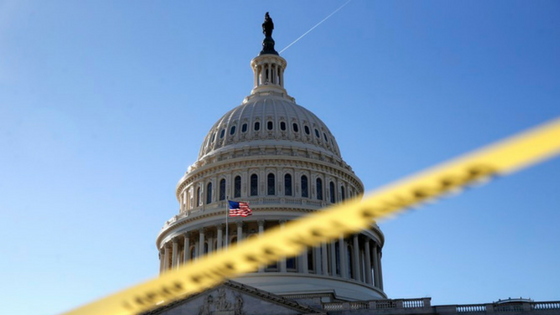It appears that the government has narrowly avoided yet another long shutdown. Are you familiar with the overall effects of a government shutdown? It could potentially hurt more than the government workers. It could hurt you, your family, and workers all across America.
The federal government plays a major role in protecting the health and welfare of the public. According to the Department of Health and Human Services 2017 contingency plan, more than half of the department’s workers would be furloughed.
The effects of this alone could be substantial.
For one, entire safety programs could be put on hold. Social Security checks would still be issued. And food stamps would continue to be funded. But with so few workers left in the department, other public health work could not remain fully intact.
Every government shutdown is different. In general, any “nonessential” federal workers would be on hold until Congress could agree on a federal budget bill.
Some of those nonessentials play a very important role in protecting the American public. For example, The CDC, or Center for Disease Control and Prevention, would lose approximately 61% of its workers.
The department’s immediate response to urgent disease outbreaks would continue. And it would use its remaining resources to collect data and report “critical information” to track and treat diseases such as influenza.
But with minimal staff, cases are bound to slip through the cracks. According to the Journal of Science Policy and Governance, there may not be enough workers left to monitor outbreaks. Testing and overseeing the effectiveness of flu shots would suffer, too. Other CDC programs beyond influenza would also be affected.
The Food and Drug Administration would also see some significant impacts from a government shutdown. The FDA would likely need to cancel routine inspections. Those inspections ensure that food is stored, processed, and distributed in safe and sanitary condition.
American workers would be at an increased risk of danger without enough federal employees. The Occupational Safety and Health Administration (OSHA), would lose many of its inspection officers. Only enough staff would be kept to handle fatalities and imminent danger situations.
The same goes for the Mine Safety and Health Administration, or MSHA. The Occupational Safety and Health Administration covers general industry and construction, while MSHA covers coal and surface miners.
Environmental protections would also experience drawbacks. Inspections could stop, along with chemical reviews and approvals. Drinking water systems and hazardous waste sites would not receive proper attention and inspection during a shutdown period.
Another result of a government shutdown is that assistance to veterans is delayed. Those hoping to receive disability benefits will have to wait. Hotlines and education centers close. Counseling services are not available. And social workers wouldn’t be available to help transition soldiers back into routine civilian lifestyles.
The great men and women who’ve given so much to their country would suffer greatly from a government shutdown. It’s an extremely unfortunate consequence of an unbalanced budget bill.
There are many negative consequences of a government shutdown. It appears that this year these problems won’t come to light. For now, we continue to benefit from government protection, regulation, and enforcement.
